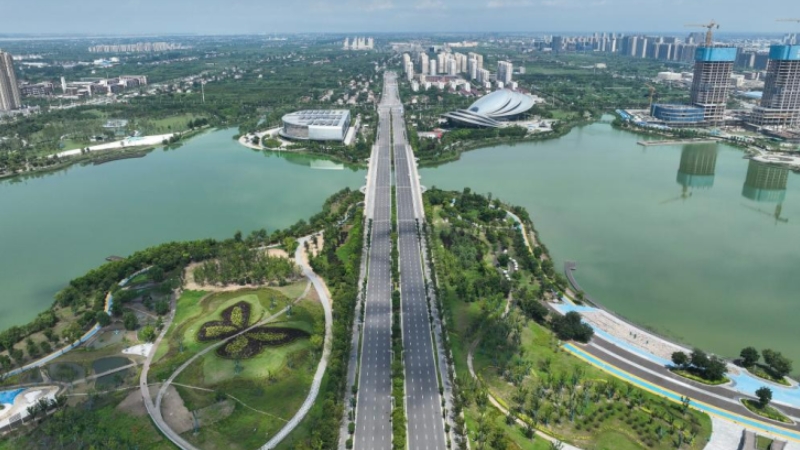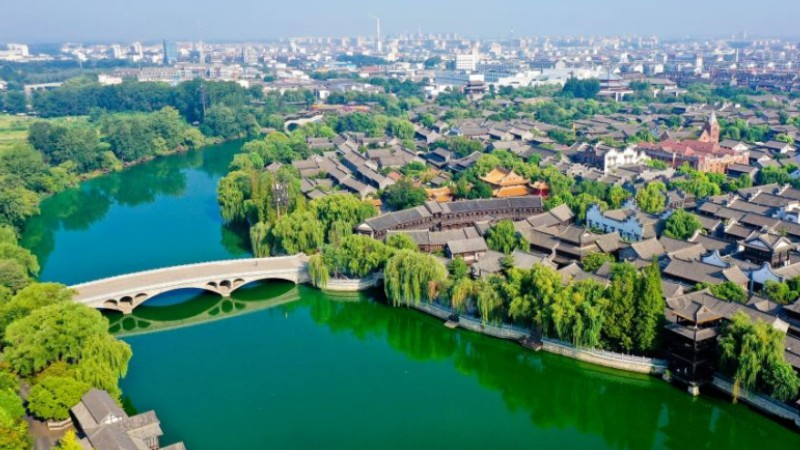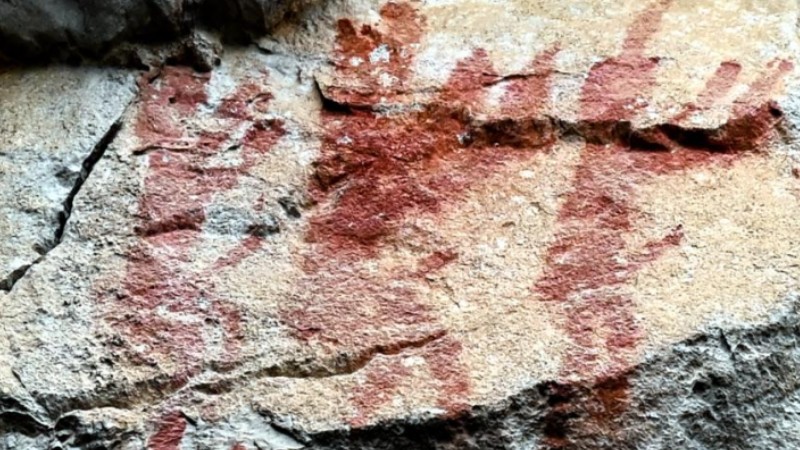Leon McCarron: Exploring is rediscovering the world
New adventures and experiences motivate Leon McCarron to explore every corner of the world, and his travel stories captivate readers from all over the globe. In the picturesque Northern Ireland countryside, People’s Daily Online interviewed the explorer, writer and broadcaster, who has just returned from a trip to Iraq.

Leon McCarron (Photo/Patrick Shead-Simmonds)
Over the last decade, McCarron has traversed more than 50,000 kilometers on foot. He is known for his long-distance expeditions and immersive storytelling through various media platforms. Since his first trip to China in 2010, McCarron has returned to the country numerous times. In 2019, he teamed up with local Chinese hiking experts in Hunan Province to work on the world-class Xuefeng Mountain hiking trail. This project also promoted China’s stunning natural landscape to international travel agencies.
In the future, McCarron aspires to develop more hiking trails in China and share more authentic and relatable stories about the country. As an explorer and writer, he is committed to introducing China’s mesmerizing landscapes and rich cultural tapestry to a global audience.
From northern to southern China

Leon McCarron (Photo/Patrick Shead-Simmonds)
People’s Daily Online: What inspired you to become an explorer growing up in Northern Ireland? What does the word “explorer” mean to you?
Leon McCarron: Northern Ireland is a small island, surrounded by the ocean, so it is hard for locals to travel to other places. From a young age, I was curious about what other places might look like. I read many books from early explorers and spent a lot of time looking at maps, wondering about different areas of the world. Once I finished university, I felt it was the right time and set off. I never thought it would turn into my career, but life takes you on its own path sometimes.
The first journey I made was in 2010 on a bicycle from New York to Hong Kong, travelling over more than 14,000 kilometres in 14 months. It was my way of trying to see and understand the world slowly in a simple way, using my own power and energy. So, I started moving to the West initially across North America and then into New Zealand, Australia and through Southeast Asia to arrive in China.
Explorers are naturally curious about the world. They are people who concerned with how to make the world better. One of the things that I love to do is travelling to somewhere like China, which is thousands of miles away from Northern Ireland, and bring back travelling stories to share back home.
People’s Daily Online: In 2012, you completed a seven-month, 5,000-kilometer expedition from Mongolia to Hong Kong. How did this expedition help you understand China?
Leon McCarron: After I finished my bicycle trip from New York to Hong Kong, I was curious to know more about China, a vast and diverse part of the world. My friend, Rob Lilwall, and I decided to walk from the northern edge of China to the southern edge of the country, cutting right through the heart of it. We not only wanted to explore the geography and landscapes of China, but also to understand the culture, history, and people. Walking across the country really allowed me to see the rapid speed at which China was changing. On our way we also encountered many hospitable and friendly Chinese people and often they were curious about where we were going and where came from.
People’s Daily Online: You mentioned that the hospitality of the Chinese people left a lasting impression. Can you share some memorable moments from your China expeditions?
Leon McCarron: We started the expedition on the northern edge of the Gobi Desert. It was winter and within about a week of travelling the weather changed completely. The temperature went to about -20 degree Celsius, which was the coldest I had ever been at that point of my life. At night there were also huge snow blizzards swept across the desert. We found many herders in this dispersedly inhabited area of the world, who not only kindly offered us food and warm drinks, but also let us stay the night with them to avoid snow blizzards. We found hospitability is everywhere in the world that such a remote landscape we still received warm welcome by local people.
I could still recall that when Rob and I were on our expedition, it was very cold. We walked along the frozen Yellow River for a few days, and we were slowly running out of food. We were starting to get quite worried until we found a small village. Just one family was living there, and a very old man walked out with his crane to greet us. He told us that he knew the way over the mountain to the next village, where we could fill up our supplies. So, he led us through an ancient pathway and zigzagged up to the top of the mountain and then down the other side. It would probably take us a day or more to figure out by ourselves and he showed us in 2 hours. He was so humble and kind and would not accept any payments. He just said, helping strangers is a very normal thing to do. I often remember him for his kindness, and I am grateful for people like him along the way.
Developing the Xuefeng Mountain hiking trail

Leon McCarron at Xuefeng Mountain, central China's Hunan Province.
People’s Daily Online: In the last few years, as a trail designer, your work has centered on Xuefeng Mountain, which is gradually becoming a popular site for hiking enthusiasts worldwide. What made this project so appealing to you?
Leon McCarron: I began working on the Xuefeng Mountain hiking trail in early 2019 with my colleagues. I travelled to China about four times to work with the local team and it took us about 1 year to create this 100-kilometre long trail, made up of existing rural paths and ancient walkways. The idea was let people to experience the meeting of the ancient world and modern China. We want visitors to be able to have a new experience and learn something about Hunan in a short amount of time and distance.
The recommended journey would take between five to eight days. It starts high up at Huxingshan Park then it comes to traditional villages and thousand-year old rice fields, down onto the Jiuxi River. One of the highlights of the trail is the Tea Horse Road, which was believed to have been walked by the ancient Chinese poet Qu Yuan on his exile; he wrote his famous poem “Songs of Chu” here. The final destination of the journey was the gorgeous Simeng Town. Instead of discovering trails in Hunan for the first time, this project used local knowledge of Hunan people. We rediscovered pathways that people in China had used for over 200 years and attached a new story to help people from all around the world to learn about them from another way. China has an emerging market in outdoor tourism, and it is a place that the rest of the world is increasingly becoming more and more interested in. Our team would love to develop more trails like this in China.

Leon McCarron in Northern Ireland (Photo/Patrick Shead-Simmonds)
People’s Daily Online: You have published three travel books, and your new book, “Wounded Tigris,” has recently come out. You once said that experiencing the Xuefeng Mountain hiking trail was like reading a book; every step, every village on the way, was part of the story. Do you have any plans to write a book about China going forward?
Leon McCarron: I would love to write a book about China. It has been a dream of mind. On the hiking trail development project, we were working on a section of the Tea Horse Road, so I learnt about this ancient connector of the world, as well as the early romantic poet Qu Yuan, who was believed to have walked this road on his exile. I think anyone in the world would enjoy learning about these ancient pathways and cultural figures. I hope at some point I will get an opportunity to write and bring some of these stories together, as well as sharing them with a wider audience.
People’s Daily Online: As an explorer, you are always traveling to different places. What is the key thing you have learned over the last two decades?
Leon McCarron: The word ‘explorer’ has changed quite a lot from the last two centuries; it used to have negative colonial connotation, associated with conquering the world. I think explorers nowadays should not travel with ideas or messages, but more to listen to other’s stories and understand how things are different in the new place. In many ways, as an explorer what I do is rediscovering.
From all these years of travelling and exploring, the thing that has stuck with me the most is that the world is a kind and friendly place. Even the world can appear to be scary or uncertain and often what we hear from the media are generally bad news, when I meet people from anywhere in the world, often I find that they share the same values. They look after their families; they want to work hard; they want a simple and happy life. So, there is a stark disconnect between news I have received and what I have seen after years of walking and cycling around the world. I try to remember and remind people around me that: despite sometimes it is hard to believe, the world is a good place. I think this is an encouraging thought for all of us.
Photos
Related Stories
Copyright © 2023 People's Daily Online. All Rights Reserved.









